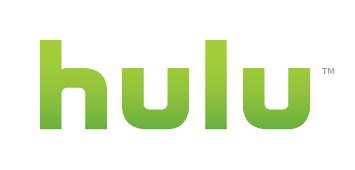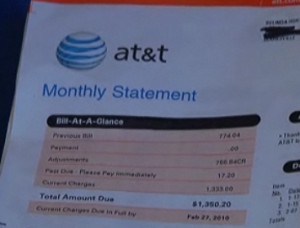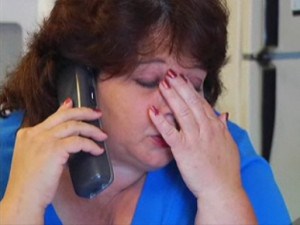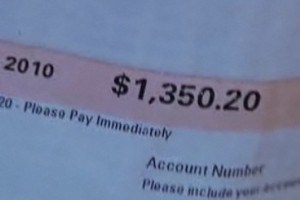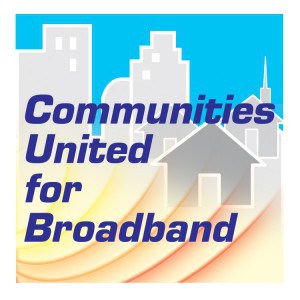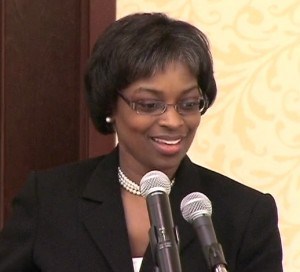
FCC Chairman Julius Genachowski wins the Cowardly Lion Award for reports he's set to sell out American consumers for corporate interests
The Washington Post this morning reports FCC Chairman Julius Genachowski is preparing to sell out a free and open Internet by adopting a provider appeasement policy that would abandon consumers and broadband users to the whims of big telecom companies.
In an extraordinarily disappointing move by the Obama Administration, which promised to adopt Net Neutrality and better broadband service for consumers, political expediency and typical Democratic party cowardice are likely to derail any hope for adopting consumer protections for the Internet.
Three sources at the [FCC] said Genachowski has not made a final decision but has indicated in recent discussions that he is leaning toward keeping in place the current regulatory framework for broadband services but making some changes that would still bolster the FCC’s chances of overseeing some broadband policies.
The sources said Genachowski thinks “reclassifying” broadband to allow for more regulation would be overly burdensome on carriers and would deter investment. But they said he also thinks the current regulatory framework would lead to constant legal challenges to the FCC’s authority every time it attempted to pursue a broadband policy.
Genachowski is living in a dream world — the non-reality-based community — if he believes for a second the nice telecom industry will happily go along with his plans for better broadband while leaving the current anti-competitive duopolistic framework of deregulation in place.
Telling a multi-billion dollar broadband industry to keep their paws off content and preserve an open and free network would be burdensome… for Stalin. It should not be for AT&T, Comcast, Time Warner Cable and Verizon. If it is, that is why we are supposed to have checks and balances to protect Americans from a corporate oligarchy. But money talks, and despite all of the repeated promises from President Barack Obama to preserve an open Internet, once the political pressure gets applied and the Money Party of corporate contributions gets going, you can always count on these people to cave in the end. “What Net Neutrality promise?”
Stop the Cap! supporters, with the help of a few “get it done” elected officials and other consumers who stood up and said “no more” to Time Warner Cable and the North Carolina legislature, managed to beat back Internet Overcharging experiments and corporate-friendly legislation to ban municipal broadband networks. We accomplished both in a matter of weeks last year. What was our secret? Integrity. We’re not behest to corporate lobbyists and industry-funded think tanks who hold the keys to post-administration job opportunities with super-sized salaries. The Obama Administration and its appointed FCC chairman seem utterly impotent to do what a regulatory agency is supposed to do — regulate. We might as well have Neville Chamberlain as FCC Chairman, because consumers are starting to feel a bit like 1938 Czechoslovakia, about to be sold out for peace inside the Beltway.
Readers, we will not be Julius Genachowski’s Tylenol. To the contrary. Chairman Genachowski appears exceptionally naive to believe he can enact any of his broadband policies over lawsuit-happy big telecoms that will promptly have them tossed out in court rulings. If you and I already know this, why doesn’t he? We need bold action, not policy capitulation. Perhaps it’s time to replace the chairman with someone who isn’t afraid to do the job.
It always shocks me when we elect an administration to lead on the issues it pursues during an election, and then cowers in fear and abandons the American people the moment some lobbyists turn up the heat and start handing out checks. Even when the overwhelming majority of Americans want a free and open Internet, somehow a handful of bureaucrats in Washington are too afraid to actually get the job done.
“The telephone and cable companies will object to any path the chairman takes,” said Art Brodsky, a spokesman for Public Knowledge, told the Post. “He might as well take the one that best protects consumers and is most legally sound.”
It’s too bad that is considered the radical solution in a lobbyist-infested Washington. It looks like we’re going to need to start counting the money and making it clear in no uncertain terms that abandoning consumers means we’ll abandon them at the next election.
Marvin Ammori, a CyberLaw Advocate:
If the Post story is predictive, there is almost no list of “horribles” that are not fair game. I’m listing ten. Most of these “horribles” have actually happened as business practices where the carriers got their way. And media companies are believed to refuse ads or stories that criticize them or oppose their position.
Comcast (or AT&T or Verizon or Time Warner Cable) could do any of the following and the FCC could do Big Fat Nothing:
(1) Block your tweets, if you criticize Comcast’s service or its merger, especially if you use the #ComcastSucks hashtag.
(2) Block your vote to the consumerist.com, when you vote Comcast the worst company in the nation. No need for such traffic to get through.
(3) Force every candidate for election to register their campaign-donations webpage and abide by the same weird rules that apply to donations by text message.
(4) Comcast could even require a “processing fee,” becoming the Ticketmaster of campaign contributions.
(5) Comcast could reserve the right to approve of every campaign online and every mass email to a political party’s or advocacy group’s list (as they do with text message short codes).
(6) If you create a small online business and hit it big, threaten to block your business unless you share 1/3 or more of all your revenues with them (apps on the iPhone app stores often are forced to give up a 1/3 or more; so are cable channels on cable TV).
(7) Block all peer to peer technologies, even those used for software developers to share software, distribute patches (world of warcraft), distribute open source software (Linux). In fact, Comcast has shown it would love to do this.
(8) Block Daily Kos, Talking Points Memo, Moveon.org (and its emails), because of an “exclusive” deal with other blogs. Or alternatively, block FoxNews.com because of a deal with NBC and MSNBC.
(9) Monitor everything you do online and sell it to advertisers, something else that some phone and cable have done, with the help of a shady spyware company.
(10) Lie to you about what they’re blocking and what they’re monitoring. Hell, the FCC wouldn’t have any authority to make them honest. The FCC couldn’t punish them.
<
p style=”text-align: center; padding-left: 30px;”>


 Subscribe
Subscribe

